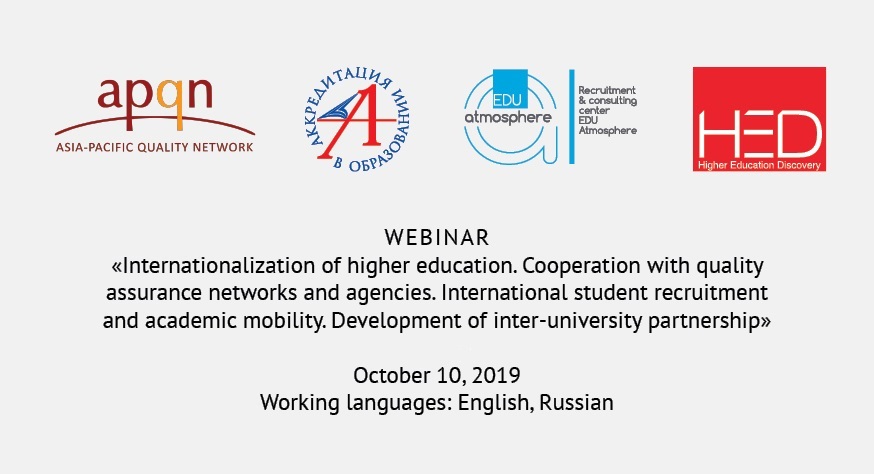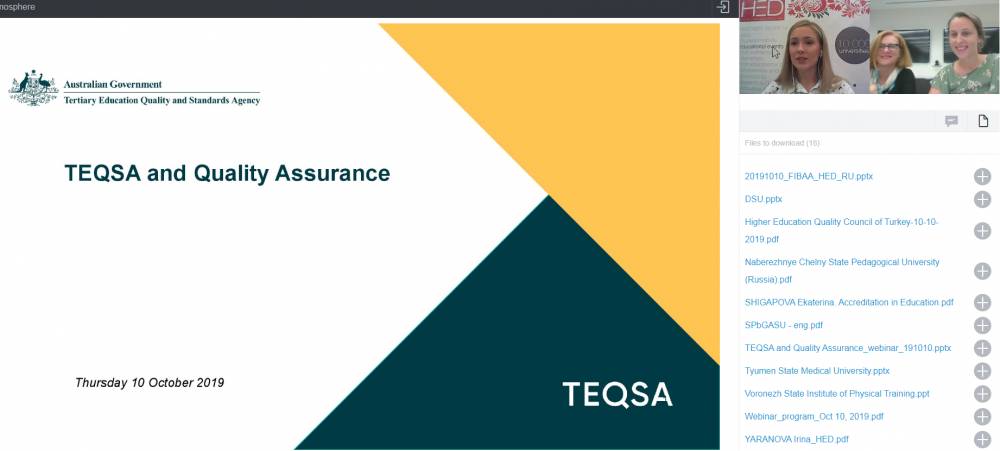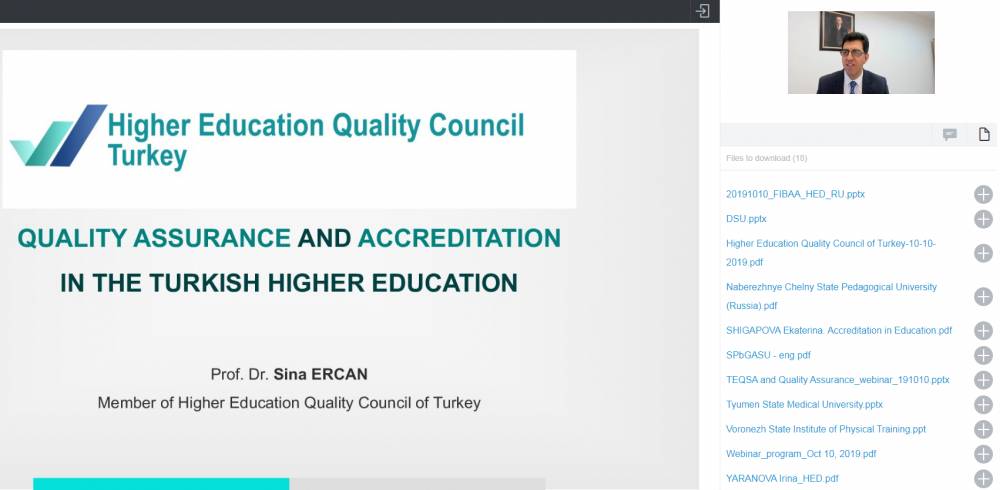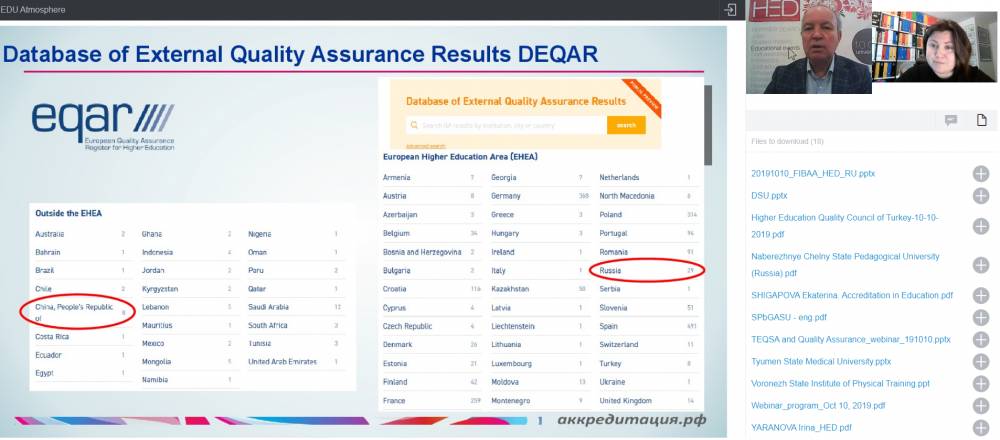HED Webinar under the aegis of APQN took place on October 10, 2019

The Accreditation in Education company (Russia) conducts the series of webinars under the aegis of the Asia-Pacific Quality Network (APQN). The webinar devoted to internationalization of higher education; cooperation with quality assurance networks and agencies; international student recruitment and academic mobility; development of inter-university partnership took place on October 10, 2019.
Asia-Pacific Quality Network (APQN) is one of international organizations that comprises over 40 countries with extremely diverse cultures, economies and political systems. APQN is aimed at overcoming these differences and uniting countries to achieve the common goal - to develop the potential of the region. APQN today is one of the most active and ambitious international organizations in the sphere of quality assurance.
The Accreditation in Education company implements the EDU Atmoshpere project on Higher Education Discovery (HED) media platform for the development of international education partnership HEDCLUB.com. EDU Atmosphere project is intended to promote Russian higher school in the global education area.
The webinar brought together representatives from Armenia, Australia, Belarus, Germany, Kazakhstan, Kyrgyzstan, Moldova, Russia, Spain, Tajikistan, Turkey: approximately 100 representatives of the professional community and 12 experts as speakers.
The Key speakers of the webinar:
- Magdalena Gaete, University Reputation Expert, Universidad de Navarra (Spain).
University of Navarra (Spain) is a top-ranked university. It was ranked third in Times Higher Education Europe Teaching Rankings 2019, after Oxford and Cambridge. University of Navarra consists of four main campuses located in Pamplona, Barcelona, San Sebastián, and Madrid. Training is provided at 17 faculties at 16 institutes. The university has two museums, two business schools in the campuses in New-York, Munich, Sao-Paulo; five research centers and two clinics (Pamplona and Madrid)

- Emily Goode, International and Industry Professional Bodies Manager Engagement Group and Karen Treloar, Director Engagement Group at Tertiary Education Quality and Standards Agency, TEQSA (Australia).
The Tertiary Education Quality and Standards Agency (TEQSA) is Australia’s independent national quality assurance and regulatory agency for higher education. TEQSA was established by the Government as Australia’s higher education regulation and quality assurance agency in 2011. The agency’s purpose is to protect student interests and the reputation of Australia's higher education sector through a proportionate, risk-reflective approach to quality assurance that supports diversity, innovation and excellence. All organizations that offer higher education qualifications (diploma or above) in or from Australia must be registered by TEQSA. Higher education providers that have not been granted self-accrediting authority must also have their courses of study accredited by the agency.
- Oleg Sernetskiy, Executive Director, Public Fund Edinstvo (Kyrgyzstan).
Since 2010 the Public Fund Edinstvo has been fostering real business development through enhancing workforce capacity: training of highly qualified specialists, retraining of current personnel, improving their qualifications, acquiring new knowledge, etc., mainstreaming of applied developments, innovation technologies and new business processes in the main sectors of Kyrgyzstan's economy. The Fund actively cooperates with leading universities of Kyrgyzstan, Russia, and Europe. As part of cooperation the Fund assists in providing training for school leavers of Kyrgyzstan so that they can enter partner universities in Kyrgyzstan, Russian, and European universities. The Fund assists Russian universities in enrollment campaigns in Kyrgyzstan.
- Svetlana Petrova, Head of Department of International Cooperation, Saint Petersburg State University of Architecture and Civil Engineering (SPbGASU).
Saint-Petersburg State University of Architecture and Civil Engineering today is a major educational and scientific center, the only university in the North-West Federal District of the Russian Federation that provides comprehensive training for specialists in the fields of civil engineering, architecture, transport, and environmental engineering systems. The university has long-standing professional and pedagogical traditions and constantly updates educational technologies, areas and methodology of research. International cooperation is one of priority areas of the university's activity. The Department of International Cooperation develops the strategy and organizes the university's international activities, interacts with foreign partners and international organizations abroad and in Russia, supports the university subdivisions' activities related to the development and implementation of international agreements, programs and projects and training of foreign specialists. The university has trained about 2,000 specialists for foreign countries. Most countries recognize the diplomas of Saint-Petersburg State University of Architecture and Civil Engineering on equal terms with European and American diplomas.

- Sina Ercan and Aslihan Nasir, Council Members, Dilek Avsaroglu, Academic expert at Higher Education Quality Council of Turkey, THEQC (Turkey).
The Higher Education Quality Council of Turkey (THEQC) is a public legal entity with administrative and financial autonomy and special budget founded with the aim of evaluating the quality levels of HEIs’ education and research activities and administrative services in accordance with the national and international quality standards, and coordinating the processes of accreditation, internal and external quality assurance, and authorization of independent external evaluation organizations. The THEQC’s mission is to strengthen quality assurance systems in higher education in order to contribute to the continuous development of HEIs in Turkey and the achievement of universal qualifications by individuals. THEQC has become the only national body responsible for quality assurance in the Turkish higher education system. As of 2019, there are 208 HEIs in Turkey, and of those 129 are state universities, 74 are foundation universities, and 5 are Vocational Schools of HEIs.
- Zhamilia Galagudina, Head of the foreign citizens testing center, Naberezhnye Chelny State Pedagogical University (Russia).
The university is one of large modern education and research guidance centers of the Volga-Kama region in the field of training of highly qualified teaching staff. It is a member of the international educational project «XXI Century Pedagogy» (Canada). The International Center of Mathematics Education of the university plays an important role in developing scientific and academic cooperation.
- Jana Bekker, Special Representative at Foundation for International Business Administration Accreditation, FIBAA (Germany).
FIBAA is a European, internationally oriented agency for quality assurance and quality enhancement in higher education. It was founded in 1994 by the German, Austrian and Swiss employers’ associations, with its head office being located in Bonn, Germany. FIBAA is a partner for Higher Education Institutions and comparable education providers. FIBAA is registered with EQAR and a member of ENQA, and all its procedures are compliant with ESG. The product portfolio comprises program-level and institutional accreditation, certification of continuing education courses, and consulting services. FIBAA offers nationally recognized accreditations (in Germany, Austria, Switzerland, Kazakhstan, and the Netherlands), and FIBAA’s Quality Seals across the globe.

- Vladimir Navodnov, Director, National Centre for Public Accreditation (Russia).
The National Centre for Public Accreditation (NCPA) was established in 2009. The staff of NCPA has extensive international experience. NCPA is a member of APQN, ENQA, INQAAHE, CHEA, AQAAIW; the staff members have a status of international experts and participate in expert evaluations of foreign accreditation agencies and higher education institutions. Vladimir Navodnov is the Director of the National Centre for Public Accreditation. Galina Motova is the Deputy Director of NCPA, and Vice President of the Asia Pacific Quality Network (APQN).
- Hajimurat Gasanov, Head of the International Relations Department, Dagestan State Agrarian University (Russia).
Back in 2013, the university adopted a long-term development program, designed for seven years, until 2020. Among the most important development priorities the university identified modernization of its educational and information activities. Strengthening academic mobility and integration into the international educational space have also been declared as important goals of the university development. So, the university has created and implemented a quality management system for training specialists at all levels of higher education. The university implements a policy of maximum informational transparency of all aspects of its activities. Over the years, the number of foreign students has grown - today representatives of other countries - Azerbaijan, Belarus, Armenia, Uzbekistan, Germany, etc. study at Dagestan State Agrarian University. So, today the university is building a modern system of continuous specialized education “school-technical college-university” on the basis of large-scale public-private partnership. This is a pioneering experience in the field of agricultural education in Russia.
- Irina Popova, Voronezh State Institute of Physical Training.
Today Voronezh State Institute of Physical Education is the integrated educational center that implements a wide range of programs: from secondary vocational education to higher education and postgraduate retraining programs. In fact, the institute builds its own educational space in the modern paradigm of «lifelong learning». The institute is justly proud of its graduates among whom are seven Olympic champions in different sports.
- Alexey Efanov, Head of the Center for International Education, Tyumen State Medical University (Russia).
Higher medical education in Russia traditionally has high public prestige. This is also confirmed by the data of admission campaigns - today medical universities in Russia are among the most in-demand HEIs not only for Russian, but also for foreign applicants. Tyumen State Medical University is one of the prominent representatives of Russian medical education. For many years, the university has been in Top 100 Russian universities. In 2019, it was also included in Top 3 medical universities in Russia by the citedness of publications on the topic “Medical Sciences and Public Health”. Its background includes not only high positions in rankings, but also participation in a number of national and international projects. For example, Tyumen State Medical University has become one of the federal pilot sites for the development of a system of continuing medical education. The university participates in the Tempus international educational project on the topic “Human security: environmental protection, food quality, public health in the territories contaminated with radioactive substances”.
The webinar organizer Accreditation in Education company welcomes APQN members to join EDU Atmosphere aimed to assist educational organizations from various countries in finding partners and associates for the implementation of educational, academic projects and initiatives.
Upcoming webinars schedule on acquaintance with Russian HEIs:
- November 5, 2019
- December 4, 2019
- February 4, 2020
- March 3, 2020
- April 7, 2020
- May 28, 2020
Please choose the convenient webinar date to present your organization during the webinar.
Feel free to nominate the speaker and confirm participation as a listener by contacting Andrei Shumelev at news@hedclub.com, Mob: +7(937) 111-50-40.
The date for the next webinar is November 5, 2019. You are welcomed!